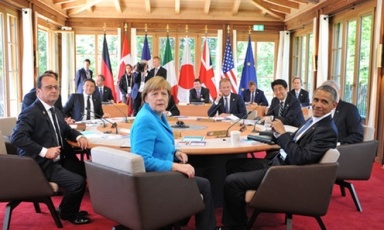- Posted on : January 25, 2014
- Posted by : Tom Fletcher
Though it has mellowed with middle age, Davos remains a place where ideas speed date. Leaders, thinkers, rock stars and businesspeople compete to set the agenda. Like a diplomatic summit (http://nakeddiplomat.wordpress.com/2013/09/24/decoding-diplomacy-a-bluffers-guide-to-international-meetings/) the most important fusions happen away from the main events.
Our PM made the pitch for Britain as the ‘Reshore Nation’. As at the UN General Assembly last year (http://blogs.fco.gov.uk/tomfletcher/2013/09/23/why-this-unga-matters-for-lebanon-and-all-of-us/), Iran has also been a major topic. If, as we must hope, President Rouhani is sincere about changing Iran’s regional activity, a lot of IRGC ‘security advisers’ will be looking for new jobs.
Unsurprisingly given the way it has captured the corporate debate, disruption has again been a major Davos theme (http://t.co/VfwnjuHAx5). Speakers debated how to respond to the next tidal wave of innovation. Disruption has always presented opportunities and threats: email replacing letters; plastics replacing wood; Wikipedia replacing encyclopaedias; agriculture replacing hunter/gathering. Companies know that they have to improve services in response or be replaced.
Diplomacy is ripe for a bit of disruption. It has evolved in the past (http://nakeddiplomat.wordpress.com/2013/10/20/ten-moments-that-changed-diplomacy/).
And must do so again (http://www.portland-communications.com/publications/digital-diplomacy-the-g8/naked-diplomacy/).
I think there are five questions about disruption that successful Foreign Ministers will need to answer.
1. Who is your competition?
Not just in the traditional sense of the need to define an enemy, though we still have to do that, and beyond states. But who is going to disrupt your business by doing it better and more cheaply? Look at companies providing better market information, lobbyists arguing against your position on climate change, fixers offering better commercial introductions, NGOs moving faster to galvanise public opinion. Look at countries competing harder for market share.
2. Is your service delivery fit for purpose?
We are seeing a massive increase in consumer power and expectations of fulfilment. Competitive service providers are responding by becoming more digitally fleet footed, personalised and savvy. How does this compare with the visa service, trade or travel advice your embassies provide? Are you taking your service to people rather than hoping they come to you?
3. Do you have the tools to compete?
Do you have enough digital natives, equipped with the right kit, to navigate this new terrain? Are your country’s brightest people involved in the technological arms race on your behalf. If not, are you fighting the wrong battle?
4. How prepared is your country for big data?
IBM famously calculate that a staggering 90% of data has been produced in the last two years. Who is curating that mass of information for you so you make the right decisions about where to put your resource, time and energy; and to tell you where the next revolution – technological or on the streets – will be? Do you have war rooms equipped to track the changes in comment and sentiment that have an impact on your country’s security and prosperity? Or are you judging ‘public opinion’ through traditional diplomatic activity that delivers just a fraction of the picture, however good your people? Are you winning the argument that you can be trusted with the data you will need to access in order to compete?
5. Do you understand how innovation is going to disrupt not just the way we work, but everything we understand about global politics?
Explaining the ways that innovation has always hit jobs, this month’s Economist concluded that “technology’s impact will feel like a tornado, hitting the rich world first, but eventually sweeping through poorer countries too. No government is prepared for it.” Ian Morris, who argues that the next 40 years are the most important in history, estimates that global development will rise as much in the next century as in the last 140. Are you confident you are part of a global governance system that can cope with the equivalent of the shift from cave paintings to the atom bomb?
Davos began as a form of disruptive diplomacy. It crashed the traditional international summit, demonstrating that conversations about the world that only involved diplomats were irrelevant.
We now need to know where the next waves of disruption will come from, and be open minded and agile in our response. Technological disruption on this scale will bring massive global political disruption – the Economist does not chuck around words like ‘tornado’. Disruption is going to make some big companies, ideas, states and international organisations redundant.
But diplomacy itself matters too much to be put out of business.
Photo credit: Cabinet Public Relations Office, Ministry of Foreign Affairs of Japan.

